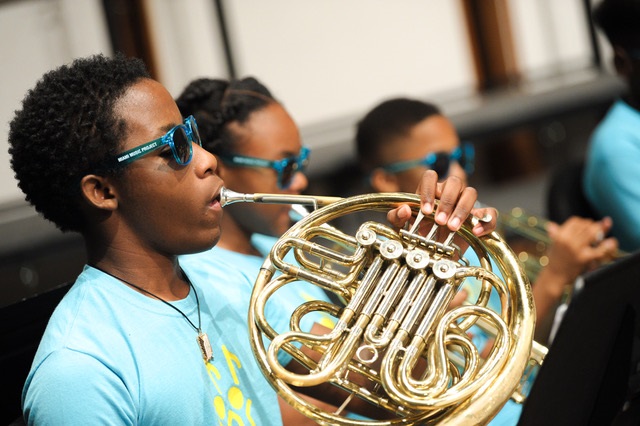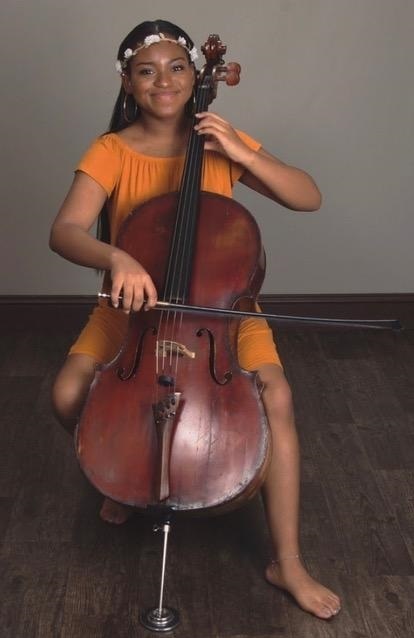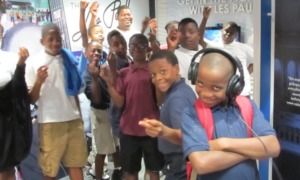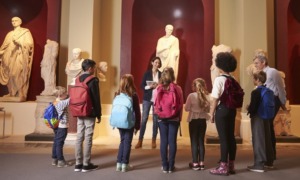
Photos by Miami Music Project
The 10-year-old Miami Music Project provides free lessons and instruments to youth in five Miami neighborhoods in a youth development program that has numerous positive impacts, according to Florida International University researchers.
Just before Bobby Bush picked up his guitar to play at the Miami Music Project Summer Camp Showcase in July, he spoke about his summer cooped up at home because of the pandemic.
“It’s kind of crazy because there’s 10 of us in the house right now. My dad’s working in his room. My mom is upstairs on her computer. … My brother’s playing cello in my room,” he said.
Bush, a college sophomore and former Miami Music Project student, also reflected on the protests going on across the nation this summer in response to police violence. His takeaway is that people should treat others as they want to be treated.
“I try to treat everybody as I would want to be treated as a Black man,” he said.
And then he and fellow student Starita D’Haiti launched into their performances — his a classical guitar piece and hers on cello — which were streamed live on Facebook. Next, from a bedroom, a kitchen and a living room, the images of youngsters in the summer music camp orchestra appeared, playing together on-screen.
These current and former members of the Miami Music Project experience the organization as a nurturing space that provides more than music lessons — it’s focused on their lives outside music, too.
Founded in Miami in 2008, the Miami Music Project’s goal is to empower kids in underserved communities to reach their full potential and to positively impact society.
“The whole idea is about using music to bring social development … to kids with the greatest needs,” said Miami Music Project President Anna Klimala. Music helps them develop skills that will lead them to be successful, she said.
The organization’s key program is the Children’s Orchestra, which operates through after-school programs in five Miami neighborhoods:
- Little Haiti, an area of mostly Haitian immigrants
- Liberty City, a historic African-American community
- Little Havana, a changing area but largely Hispanic
- Miami Springs, a largely Hispanic community near the airport
- Miami Gardens, a mostly African-American community north of Miami.
The program and the musical instruments are provided for free.
Last school year, kids came daily to the after-school program, where they did homework, had a snack and then spent two hours with the orchestra. Miami Music Project also runs a four-week summer camp as well as its Orchestra Boot Camp, intensive one-day workshops held throughout the year, often on teacher planning days or on Saturdays.
Making life richer
Before the pandemic, Miami Music Project expected to have 550 kids in the Children’s Orchestra and to serve a total of 760 children this year. Numbers are reduced, but the program continues virtually.
Music makes life richer for kids, Klimala said. Those who become fully involved do better in school, get along with others better and learn to collaborate, she said.
“Out of all the art forms, playing an instrument is the one that develops such a large array of different skills,” she said.
For example, it impacts the executive function area of the brain and it teaches concentration, she said, pointing to research from the University of Southern California. “That’s a huge problem these days,” she said.
Unlike the usual model for music education in the United States, the focus at Miami Music Project is not on individual music lessons, according to Florida International University researchers who have been studying the program. Instead, instruction is in an ensemble setting.
A basic idea is that working together in an ensemble reinforces young people’s individual development, they wrote. Lessons are frequent and intense.
The impact went well beyond “cognitive benefits of individual musical training,” according to the study, published in the Journal of Youth Development.
El Sistema
The organization uses the El Sistema approach developed by economist and musician José Antonio Abreu in 1970s Venezuela to address extreme poverty.
“He created this whole concept of social transformation through music,” Klimala said. It challenges the prevailing system in which classical musicians are mostly white and mostly men.
“He gave violins to kids in the slums in Caracas,” she said. It challenged the idea that art is just for people who are talented and wealthy.
El Sistema has inspired numerous programs around the world. In the United States, El Sistema USA has 115 member organizations that reach 20,000 children and youth in 34 states.
Klimala grew up in Poland, where music was part of every child’s education. She sees it as an essential part of children’s development.

Former student Starina D’Haiti says that music gave her a voice and helped her navigate after surviving the 2010 earthquake in Haiti and starting a new life in Miami. She is now a sophomore at DePauw University.
“What I see happening here [in the United States] is that music is treated as an extra thing, but it’s as important as math or science,” she said.
It gives children and youth an outlet, a means of expressing emotion when they don’t know how to express it in words, she said.
“We know that young kids have a lot of different anxieties,” Klimala said. “The more outlets we give them, the better.”
D’Haiti, the former student who was a featured performer at the Summer Music Camp Showcase, came from Haiti with her sisters and aunt after the devastation of the 2010 earthquake there. After the trauma of the earthquake, adjustment to a new life was hard. D’Haiti was filled with anxiety and had trouble even talking to people. In 2012, she and her sister were among the first members of the newly formed Little Haiti chapter of the Miami Music Project.
Her instrument made her feel she had a voice, she said.
“No matter what I may be going through, whether it be if I’m crying or if I’m happy it’s just always there for me,” D’Haiti told Enspire magazine. “When I play it almost feels as if nothing else exists, all my problems just go right out the window.”
She is now a sophomore at DePauw University majoring in music performance and biology.
Pressures of pandemic
Just as the COVID-19 pandemic has transformed the nation, it has changed the way Miami Music Project operates.
The transition to online classes was difficult. “It was quite chaotic,” Klimala said. Kids and families had lots of issues with connectivity and internet access. Many kids live in large households with several generations.
The number of students dropped to about 350, she said.
The five community chapter sites are now virtual hubs offering online classes.
“There is no technology that allows [multiple musicians] to perform at the same time,” Klimala said. The online lessons have to be set up so that one student plays while the others play along with their sound muted, she said.
Teachers have had to get creative. For example, they’ve set up a drive-through station to tune kids’ instruments and handle broken strings.
Teaching artists focus on communication and contact with kids and families.
“Because this program is as much about music as it is about social engagement with our students and their families, we dedicate the better part of our day keeping in close contact with our kids,” Claudens Louis, site director of the Miami Music Project’s Little Havana chapter, told Miami Community Newspapers.
But an unexpected benefit of online lessons is that siblings and adult family members are now participating in classes, Klimala said.
And the Summer Music Camp, which normally has 180 campers, was able to accommodate more than 250 online, she said.
The organization, which gets 65% of its funding from individual donors, has seen its income drop and has cut its budget 10%, Klimala said. It’s postponing the opening of a sixth community chapter.
But she said they are rising to the challenges. It’s also inaugurating a series on online events in August to discuss racism and inequality.
This article has been updated.






























